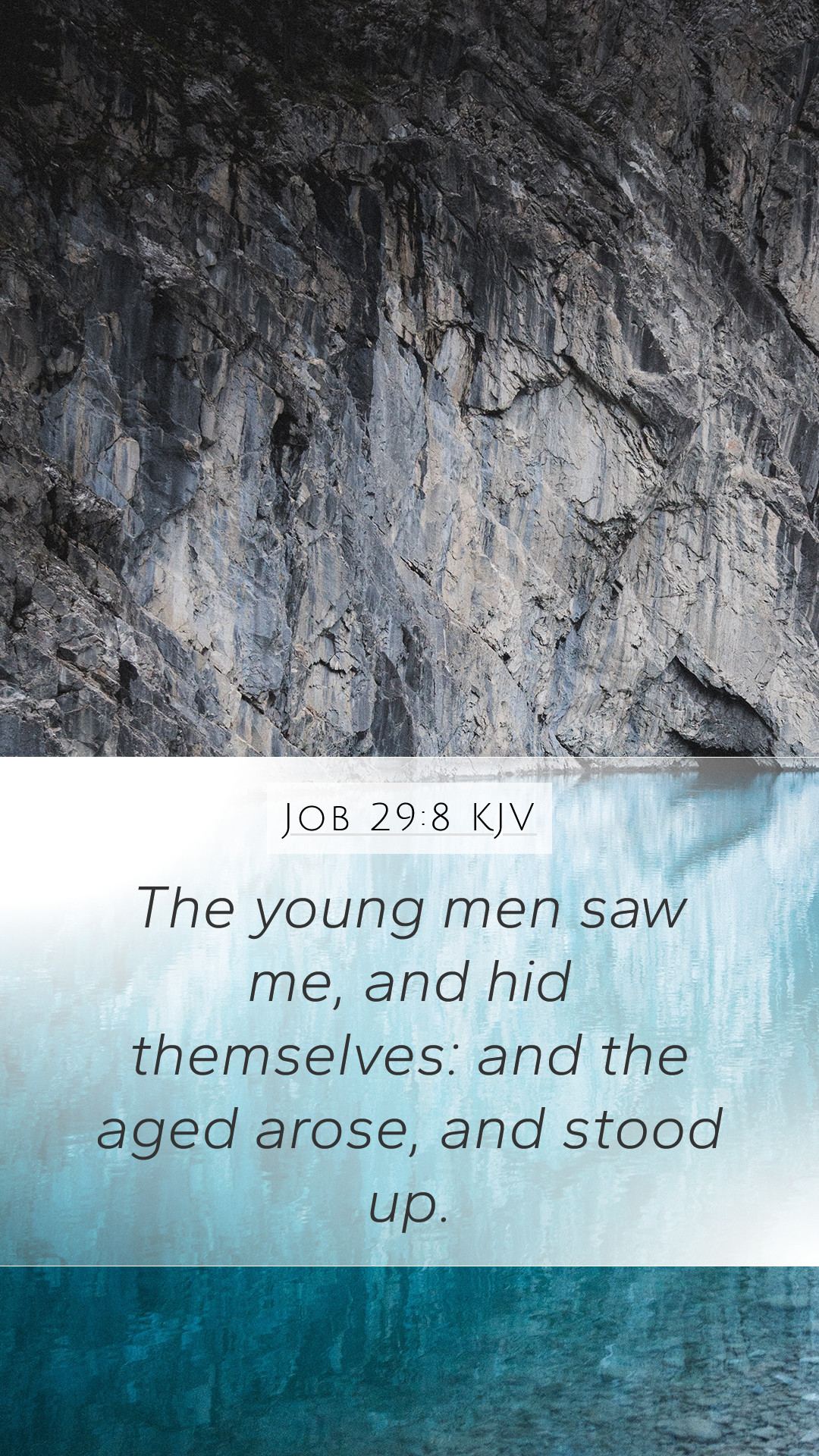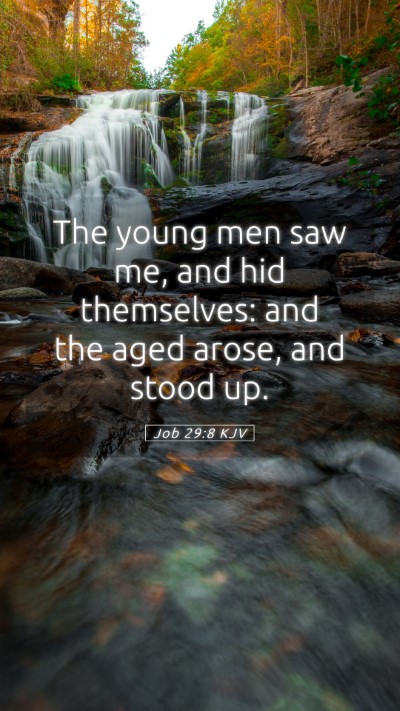Old Testament
Genesis Exodus Leviticus Numbers Deuteronomy Joshua Judges Ruth 1 Samuel 2 Samuel 1 Kings 2 Kings 1 Chronicles 2 Chronicles Ezra Nehemiah Esther Job Psalms Proverbs Ecclesiastes Song of Solomon Isaiah Jeremiah Lamentations Ezekiel Daniel Hosea Joel Amos Obadiah Jonah Micah Nahum Habakkuk Zephaniah Haggai Zechariah MalachiJob 29:8 Meaning
What is the meaning of Job 29:8?
The young men saw me, and hid themselves: and the aged arose, and stood up.
Job 29:8 Bible Verse Meaning
Understanding Job 29:8
Job 29:8 reads: "The young men saw me and hid themselves; and the aged arose, and stood up." This verse, part of Job's reflections on his past, offers profound insights into the themes of respect, authority, and societal norms.
Bible Verse Interpretations
This verse illustrates Job's esteemed position before his trials. Here, we explore interpretations from notable scholars:
- Matthew Henry: Henry emphasizes Job's moral integrity and the societal reverence he commanded. The young men, in their inexperience, feel inferior in his presence, while the aged show respect for his wisdom, indicative of the honor associated with wisdom and experience.
- Albert Barnes: Barnes notes that this reflects the natural order of respect in society. Young men, representing the strength and vitality of youth, acknowledge Job’s greatness by withdrawing in shame or awe, while the aged, associated with wisdom, honor him by rising.
- Adam Clarke: Clarke discusses the cultural context where respect for elders and those of higher status is paramount. Job's description highlights his prior role as a figure of authority and respect within his community.
Bible Study Insights
To properly appreciate the weight of Job 29:8, it is essential to consider its implications in the broader narrative of Job's trials. Here are some insights:
- Context of Suffering: Job reflects on his previous life before calamities struck. This juxtaposition of past reverence and current suffering provides profound commentary on human dignity and respect.
- Emotional Resonance: This verse evokes a sense of loss. Job reminisces about a time when his presence commanded respect, and this serves to underline his current desolation.
- Social Dynamics: The reactions of the young and aged towards Job help to discuss how society values wisdom and respect and how quickly circumstances can change perceptions.
Scripture Analysis
Analyzing Job 29:8 requires an understanding of the social structure in biblical times. Job’s esteemed reputation as a wise and good leader was pivotal for his identity.
- Respect in Society: The young men’s withdrawal signifies acknowledgment of moral authority, which can lead to discussions about the role of respect in our communities today.
- The Aging Process: The reaction of the aged underscores the biblical view of wisdom through experience, inviting a deeper exploration of how age is perceived in different cultures.
- Job's Transformation: The verse marks a transition from Job's former glory to his present suffering; thus, it serves as a poignant reminder of life’s volatility.
Biblical Exegesis and Applications
In applying Job 29:8 to daily life, it offers lessons on humility, respect, and the transient nature of social standing:
- Lesson on Humility: One's position can change rapidly; humility is vital regardless of stature.
- Value of Respect: Encouraging youth to respect elders fosters a community of learning and wisdom-sharing.
- Acceptance of Change: Understanding that life can dramatically alter emphasizes resilience and faith.
Cross References
Job 29:8 connects with several other biblical themes and passages:
- Proverbs 16:31: "The hoary head is a crown of glory, if it be found in the way of righteousness."
- 1 Timothy 5:1-2: "Rebuke not an elder, but entreat him as a father; and the younger men as brethren."
- Proverbs 1:5: "A wise man will hear, and will increase learning; and a man of understanding shall attain unto wise counsels."
Conclusion
Job 29:8 serves as a reflection of the respect and honor Job once commanded in his community. Through its analysis, we glean insights into the importance of wisdom and dignity in relationships. Studying this verse helps in understanding the broader implications of respect within Scripture, emphasizing how it can inform our interactions today.


